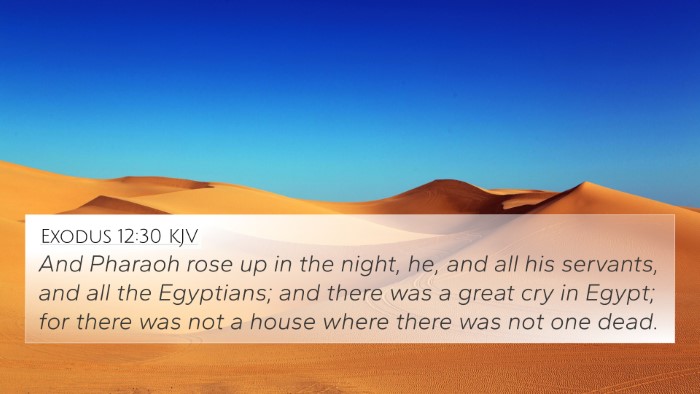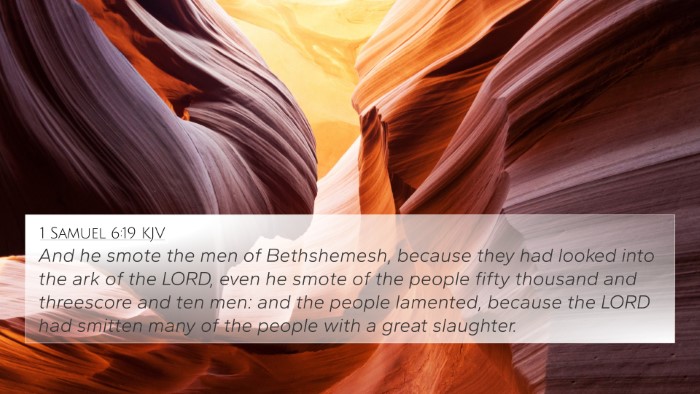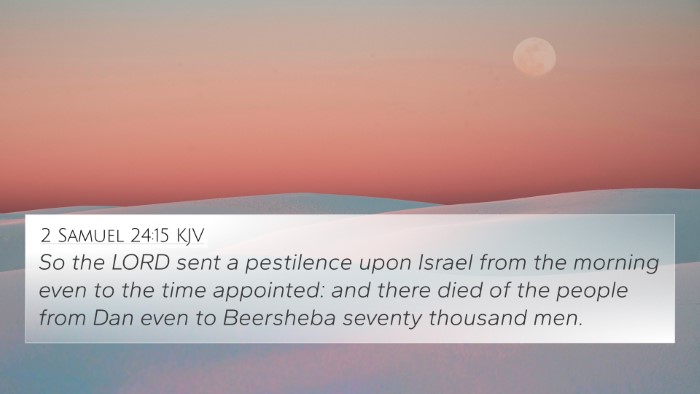Understanding 1 Chronicles 21:14
The verse 1 Chronicles 21:14 states:
“So the LORD sent a plague upon Israel; and there fell of Israel seventy thousand men.”
Context and Background
This verse is set within a narrative where King David, prompted by Satan, takes a census of Israel, which was against God's command. This act of pride and reliance on numbers rather than faith leads to divine judgment.
Summary of Meaning
This verse illustrates the theme of divine punishment for disobedience and highlights God’s sovereignty over nations. The immediate consequence of David's decision is serious, showing that sin can lead to widespread repercussions.
Interpretation from Commentaries
Insights from public domain commentaries provide a deeper understanding of this passage:
-
Matthew Henry:
Henry explains that the plague serves as a divine response to David's action, emphasizing that God often uses severe means to bring His people back to repentance. The significant loss of life reflects the seriousness of David's sin, highlighting the consequences of turning away from God's commandments.
-
Albert Barnes:
Barnes points out that this event illustrates God’s mercy intermingled with judgment. Even though David's sin warranted severe punishment, the limit placed on the devastation shows that God’s grace still exists within His justice. The selection of the number seventy thousand may imply a definitive divine response rather than chaos.
-
Adam Clarke:
Clarke interprets the plague as a warning and a call for Israel to return to God. He delves into the implications of the number of deaths, suggesting that it serves as a serious wake-up call to the nation regarding the importance of adhering to God's will. Clarke also discusses the theological significance of the event in broadening the understanding of God’s interactions with His people.
Thematic Bible Verse Connections
1 Chronicles 21:14 can be cross-referenced with several other scriptures that address themes of divine judgment, the consequences of sin, and God's mercy:
- 2 Samuel 24:15: This verse parallels the account of the plague sent by God due to David's census, affirming the continuity of the narrative.
- 1 Chronicles 21:1: Highlights the role of Satan in prompting David's census, framing the act within the context of spiritual warfare.
- Exodus 32:35: Relates to the consequence of Israel's actions during Moses' leadership, illustrating God's judgment upon sin.
- Jeremiah 14:12: Talks about God withholding mercy in response to the sins of the people, showing a thematic relationship to divine punishment.
- Romans 6:23: A New Testament verse that reflects on the consequences of sin, linking the Old Testament narrative to the broader theme of redemption.
- Psalm 38:3: The psalmist's lament about the impact of sin parallels the collective suffering in Chronicles, emphasizing personal and communal repercussions.
- Hebrews 12:6: Discusses God’s discipline, which aligns with the theme of punishment found in 1 Chronicles 21:14.
Cross-Referencing Biblical Texts
The practice of cross-referencing Biblical texts helps to illuminate the interconnectedness of scripture. By examining parallels like those in the verses mentioned above, one gains a richer understanding of biblical themes:
- Identifying connections: The connectivity between Old and New Testament themes of judgment and redemption is critical for comprehensive studies.
- Tools for Bible cross-referencing: Utilizing tools such as Bible concordances and cross-reference guides can enhance the study experience, shedding light on thematic relationships.
- Cross-reference Bible study: Engaging with cross-referenced themes allows for deeper interpretations of scripture, particularly in narratives of divine judgment.
- Comprehensive Bible cross-reference materials: Many resources offer extensive lists of interrelated verses which facilitate the understanding of complex themes like sin and redemption.
Conclusion
In summary, 1 Chronicles 21:14 serves as a potent reminder of the seriousness of sin and the reality of divine judgment, while also providing insights into God’s mercy. By studying biblical cross-references, one can appreciate the depth and richness of scripture, allowing for a transformative understanding of faith and obedience.
Further Study Suggestions
For those interested in further exploration, consider examining:
- Comparative studies of punishment as seen in the Old Testament versus the New Testament.
- The influence of David's actions on the Israelite community and subsequent generations.
- Lessons learned from biblical narratives that showcase God's grace in the face of human failure.









